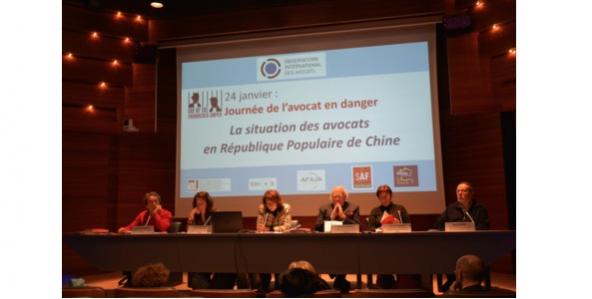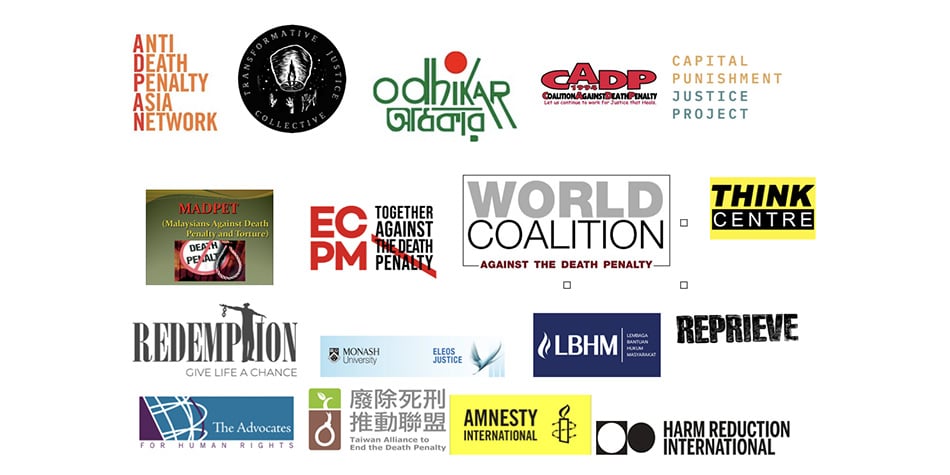
Day of the Endangered Lawyer: spotlight on China
Asia
24 January 2017 was the Day of the Endangered Lawyer. Hold every year by several lawyers’ organisations, this international initiative is the occasion to raise awareness among the civil society on the situations of jeopardised lawyers in a given country. 2017’s edition was dedicated to China because of the persecutions undergone by lawyers committed to the defence of the rights of their fellow citizens. In Paris, a colloquium took place at the "Maison du Barreau" (Bar Association offices).
The human rights lawyers’ movement in China
For several years, and particularly since 2015, lawyers have been undergoing a crackdown aiming at detering them from taking charge of so-called “politically sensitive” cases. Despite the risks, around 500 of them are still working on the defence of the fundamental rights of their fellow citizens.
2003-2013: the emergence of a human rights lawyers’ movement
In 2003, Chinese lawyers decided to get organised and to publicly oppose the State whenever the rights of the citizens would be violated. That same year, 27-year-old Sun Zhigang had been wrongfully imprisoned in a migrant detention centre and died there, beaten up by the prison guards, as revealed by an inquiry led by a local newspaper. The case struck the public opinion, and a lawyers’ group offered free legal services to Sun’s family. A movement was born.
Strengthened by diverse events, such as peaceful gatherings calling for an enhanced respect of human rights (2011), the movement resulted in the creation of a real network gathering human rights lawyers in 2013.
This movement extensively uses the internet, especially social networks (Weibo) in order to raise larger public awareness and to call upon the authorities to implement legislative reforms. Nonetheless, Chinese authorities also use the social networks to bring discredit upon certain lawyers. Videos showing lawyers incriminating themselves were thus released.
Obstacles and harassment: the 709 crackdown
Cheung Yiu-Leung (China Human Rights Lawyers Concern Group, Hong Kong) reminds us of the submission of the bar associations to the State power. For instance, lawyers working on cases labelled as “politically sensitive” might be denied the renewal of their licence, which is however a requirement to practice their profession.
Eva Pils, Professor at London Kings’ College, describes the brutality of the so-called "709 crackdown": more than 200 lawyers, legal experts, and human rights defenders have been arrested since July 2015. The first to be arrested was Wang Yu, kidnapped on 9 July 2015 and still behind bars, accused of “subversion of State power”. 19 are still detained, including 4 under house arrest in secret locations. Zhou Shifeng, founding member of the Fengrui practice, is among the victims of “enforced disappearance”.
Several of those prisoners are deprived from any access to their lawyer. Pressure exercised on the families, travel bans, etc.: the authorities have established a real climate of terror.
Chinese lawyers and the death penalty politics
The submission of the judiciary to the political objectives of the party is at its height when looking at the death penalty policies. Eva Pils quotes Teng Biao, lawyer and director of “China against death penalty”: “totalitarian and post-totalitarian regimes need the death penalty as much as they need enemies”. If the number of executions in China remains a State secret, it is certain that the country alone carries out more executions than all other countries combined.
Unfair legal proceeding
Although all human rights lawyers who have defended people facing the death penalty are not in favour of the abolition, they all agree that its current implementation in China violates human rights. Many confessions are obtained under torture, and this practise questions – to say the least – the veracity of the evidence gathered. As a result, miscarriages of justice are frequent.
Pointing out the inequities of the proceedings is not without risk. And it is in the context of a widely publicised judicial error that the lawyers Li Heping and Li Chunfun have been arrested while taking part in a demonstration. They were claiming the right to meet their clients, who had been accused of murder, rape, and theft. Sentenced to death in January 2003, the four defendants of the “Leping case” have been finally acquitted in 2016. Nonetheless, some of their lawyers are still behind bars. Recently freed, Li Chunfu is suffering under heavy mental disorders. In January, it appeared that Li Heping had been tortured.
Can we rely on the discourse of progressive change ?
If some government members, academics and NGOs are still optimistic in light of the announces – by Beijing – of a modernisation of the legal proceedings, Marie Holzman (president of Solidarité Chine) and Eva Pils remain sceptical. Both insist on the fact that the official discourse on the “decreased number” of convicts remains unverifiable, given the absence of data.
More broadly, and despite encouraging initiatives from the civil society, the speakers note the radically anti-democratic orientation of the party. The latter makes even more necessary events such as the Day of the endangered lawyers, as Richard Sédillot recalled it: “Persecuted lawyers hold on because they know they are supported. Without the media coverage, some of them would have died”.
For further information:
> Xie Yang, tortured over and over during his 228 days in jail
> Wang Quanzhang and Li Heping, who have been tortured with electricity, have no access to their lawyer







